Emergency Management: UK and International Incident Analysis Report
VerifiedAdded on 2023/01/23
|14
|3410
|63
Report
AI Summary
This report delves into the intricacies of emergency management systems, primarily focusing on the United Kingdom's approach and incorporating real-world incidents both domestically and internationally. It commences with an executive summary outlining the core principles and the uncertain nature of emergencies, emphasizing the significance of preparedness and the various types of emergencies such as terrorist attacks, floods, and disease outbreaks. The report then explores the principles of effective emergency incident response, including anticipation, preparedness, subsidiarity, direction, information, integration, cooperation, and continuity. Furthermore, it examines the stages of recovery, encompassing humanitarian, economic, infrastructure, and environmental aspects. The report underscores the importance of community self-determination in the recovery process and highlights the role of Recovery Coordinating Groups (RCG) in parallel with Strategic Coordinating Groups (SCG). The report also references the Civil Contingencies Act 2004 and the roles of various organizations in disaster management within the UK, offering a comprehensive overview of emergency management practices and principles.
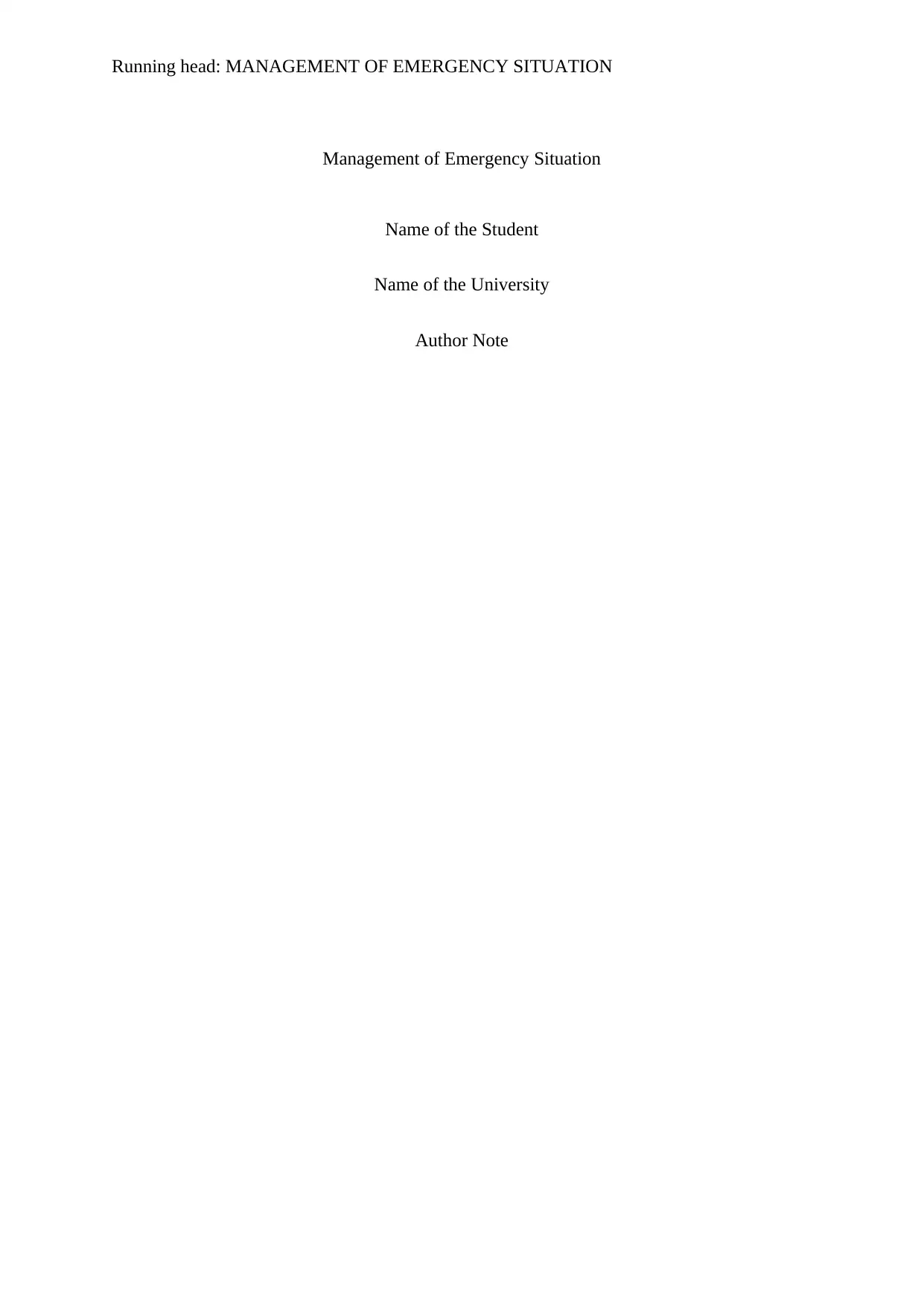
Running head: MANAGEMENT OF EMERGENCY SITUATION
Management of Emergency Situation
Name of the Student
Name of the University
Author Note
Management of Emergency Situation
Name of the Student
Name of the University
Author Note
Paraphrase This Document
Need a fresh take? Get an instant paraphrase of this document with our AI Paraphraser
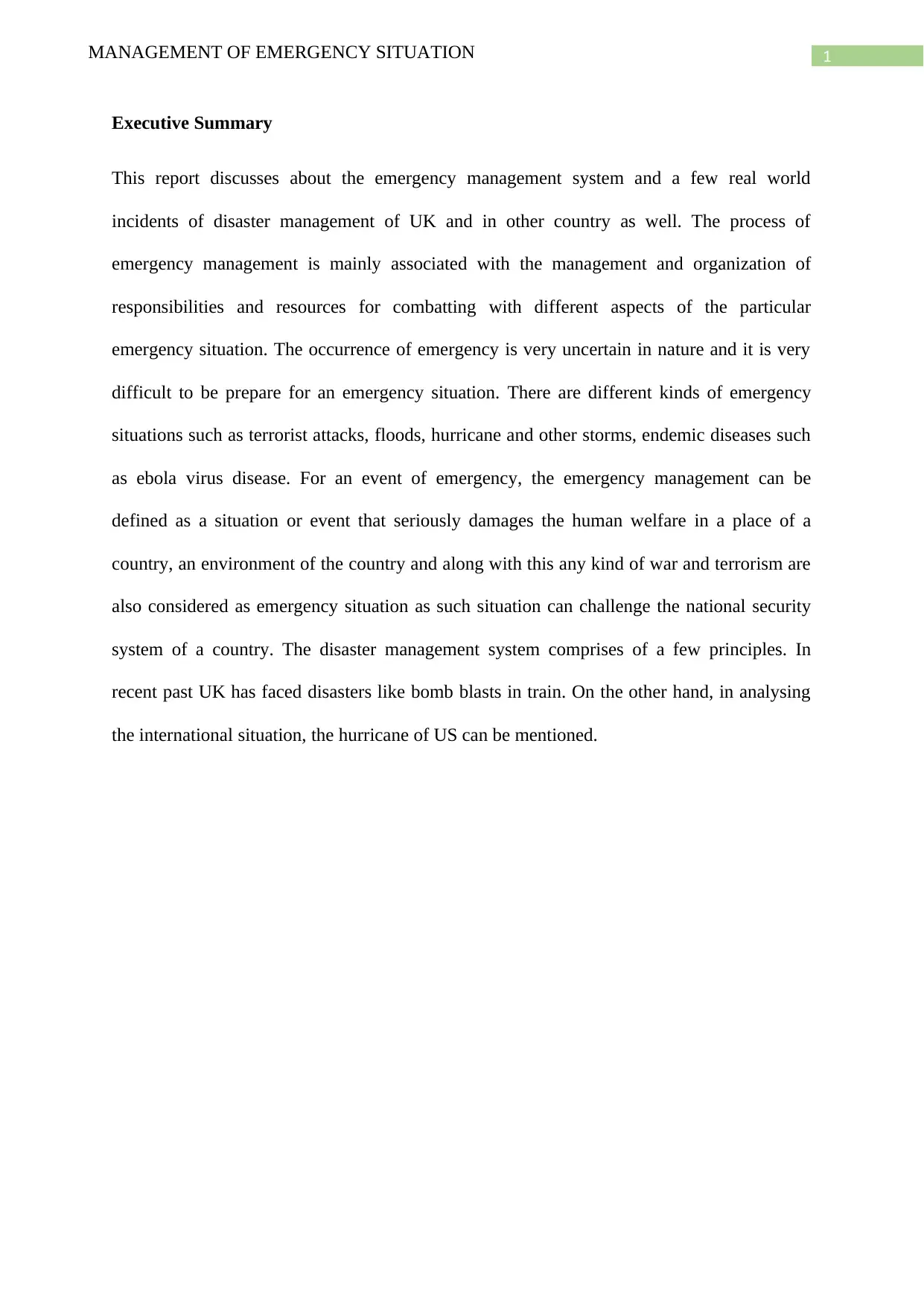
1MANAGEMENT OF EMERGENCY SITUATION
Executive Summary
This report discusses about the emergency management system and a few real world
incidents of disaster management of UK and in other country as well. The process of
emergency management is mainly associated with the management and organization of
responsibilities and resources for combatting with different aspects of the particular
emergency situation. The occurrence of emergency is very uncertain in nature and it is very
difficult to be prepare for an emergency situation. There are different kinds of emergency
situations such as terrorist attacks, floods, hurricane and other storms, endemic diseases such
as ebola virus disease. For an event of emergency, the emergency management can be
defined as a situation or event that seriously damages the human welfare in a place of a
country, an environment of the country and along with this any kind of war and terrorism are
also considered as emergency situation as such situation can challenge the national security
system of a country. The disaster management system comprises of a few principles. In
recent past UK has faced disasters like bomb blasts in train. On the other hand, in analysing
the international situation, the hurricane of US can be mentioned.
Executive Summary
This report discusses about the emergency management system and a few real world
incidents of disaster management of UK and in other country as well. The process of
emergency management is mainly associated with the management and organization of
responsibilities and resources for combatting with different aspects of the particular
emergency situation. The occurrence of emergency is very uncertain in nature and it is very
difficult to be prepare for an emergency situation. There are different kinds of emergency
situations such as terrorist attacks, floods, hurricane and other storms, endemic diseases such
as ebola virus disease. For an event of emergency, the emergency management can be
defined as a situation or event that seriously damages the human welfare in a place of a
country, an environment of the country and along with this any kind of war and terrorism are
also considered as emergency situation as such situation can challenge the national security
system of a country. The disaster management system comprises of a few principles. In
recent past UK has faced disasters like bomb blasts in train. On the other hand, in analysing
the international situation, the hurricane of US can be mentioned.

2MANAGEMENT OF EMERGENCY SITUATION
Table of Contents
Introduction...........................................................................................................................................3
Review of Real World Emergency Incidents.........................................................................................9
Investigation of Real World Case......................................................................................................9
International Emergency Incidents..................................................................................................10
Conclusion...........................................................................................................................................10
References.......................................................................................................................................12
Table of Contents
Introduction...........................................................................................................................................3
Review of Real World Emergency Incidents.........................................................................................9
Investigation of Real World Case......................................................................................................9
International Emergency Incidents..................................................................................................10
Conclusion...........................................................................................................................................10
References.......................................................................................................................................12
⊘ This is a preview!⊘
Do you want full access?
Subscribe today to unlock all pages.

Trusted by 1+ million students worldwide
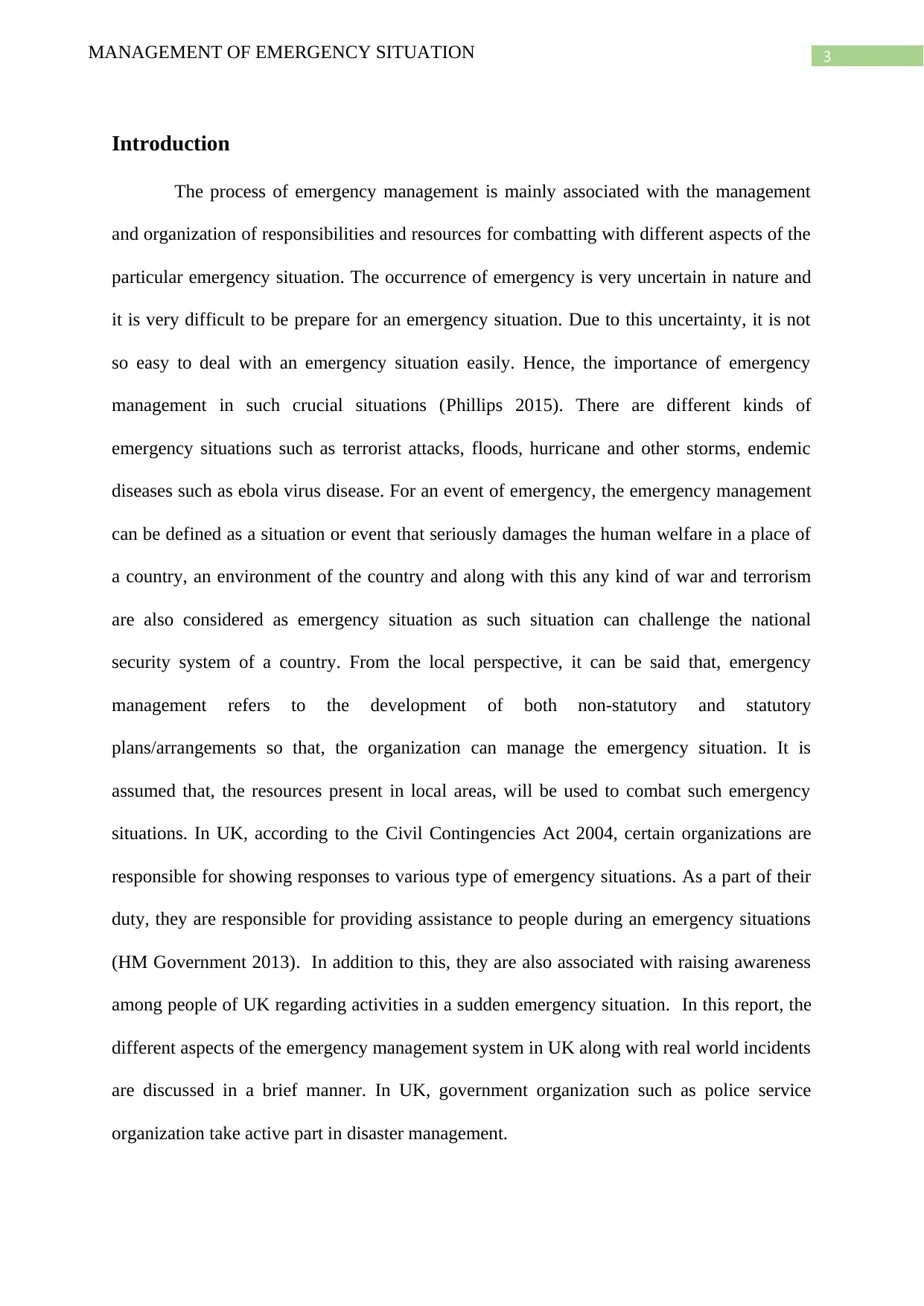
3MANAGEMENT OF EMERGENCY SITUATION
Introduction
The process of emergency management is mainly associated with the management
and organization of responsibilities and resources for combatting with different aspects of the
particular emergency situation. The occurrence of emergency is very uncertain in nature and
it is very difficult to be prepare for an emergency situation. Due to this uncertainty, it is not
so easy to deal with an emergency situation easily. Hence, the importance of emergency
management in such crucial situations (Phillips 2015). There are different kinds of
emergency situations such as terrorist attacks, floods, hurricane and other storms, endemic
diseases such as ebola virus disease. For an event of emergency, the emergency management
can be defined as a situation or event that seriously damages the human welfare in a place of
a country, an environment of the country and along with this any kind of war and terrorism
are also considered as emergency situation as such situation can challenge the national
security system of a country. From the local perspective, it can be said that, emergency
management refers to the development of both non-statutory and statutory
plans/arrangements so that, the organization can manage the emergency situation. It is
assumed that, the resources present in local areas, will be used to combat such emergency
situations. In UK, according to the Civil Contingencies Act 2004, certain organizations are
responsible for showing responses to various type of emergency situations. As a part of their
duty, they are responsible for providing assistance to people during an emergency situations
(HM Government 2013). In addition to this, they are also associated with raising awareness
among people of UK regarding activities in a sudden emergency situation. In this report, the
different aspects of the emergency management system in UK along with real world incidents
are discussed in a brief manner. In UK, government organization such as police service
organization take active part in disaster management.
Introduction
The process of emergency management is mainly associated with the management
and organization of responsibilities and resources for combatting with different aspects of the
particular emergency situation. The occurrence of emergency is very uncertain in nature and
it is very difficult to be prepare for an emergency situation. Due to this uncertainty, it is not
so easy to deal with an emergency situation easily. Hence, the importance of emergency
management in such crucial situations (Phillips 2015). There are different kinds of
emergency situations such as terrorist attacks, floods, hurricane and other storms, endemic
diseases such as ebola virus disease. For an event of emergency, the emergency management
can be defined as a situation or event that seriously damages the human welfare in a place of
a country, an environment of the country and along with this any kind of war and terrorism
are also considered as emergency situation as such situation can challenge the national
security system of a country. From the local perspective, it can be said that, emergency
management refers to the development of both non-statutory and statutory
plans/arrangements so that, the organization can manage the emergency situation. It is
assumed that, the resources present in local areas, will be used to combat such emergency
situations. In UK, according to the Civil Contingencies Act 2004, certain organizations are
responsible for showing responses to various type of emergency situations. As a part of their
duty, they are responsible for providing assistance to people during an emergency situations
(HM Government 2013). In addition to this, they are also associated with raising awareness
among people of UK regarding activities in a sudden emergency situation. In this report, the
different aspects of the emergency management system in UK along with real world incidents
are discussed in a brief manner. In UK, government organization such as police service
organization take active part in disaster management.
Paraphrase This Document
Need a fresh take? Get an instant paraphrase of this document with our AI Paraphraser
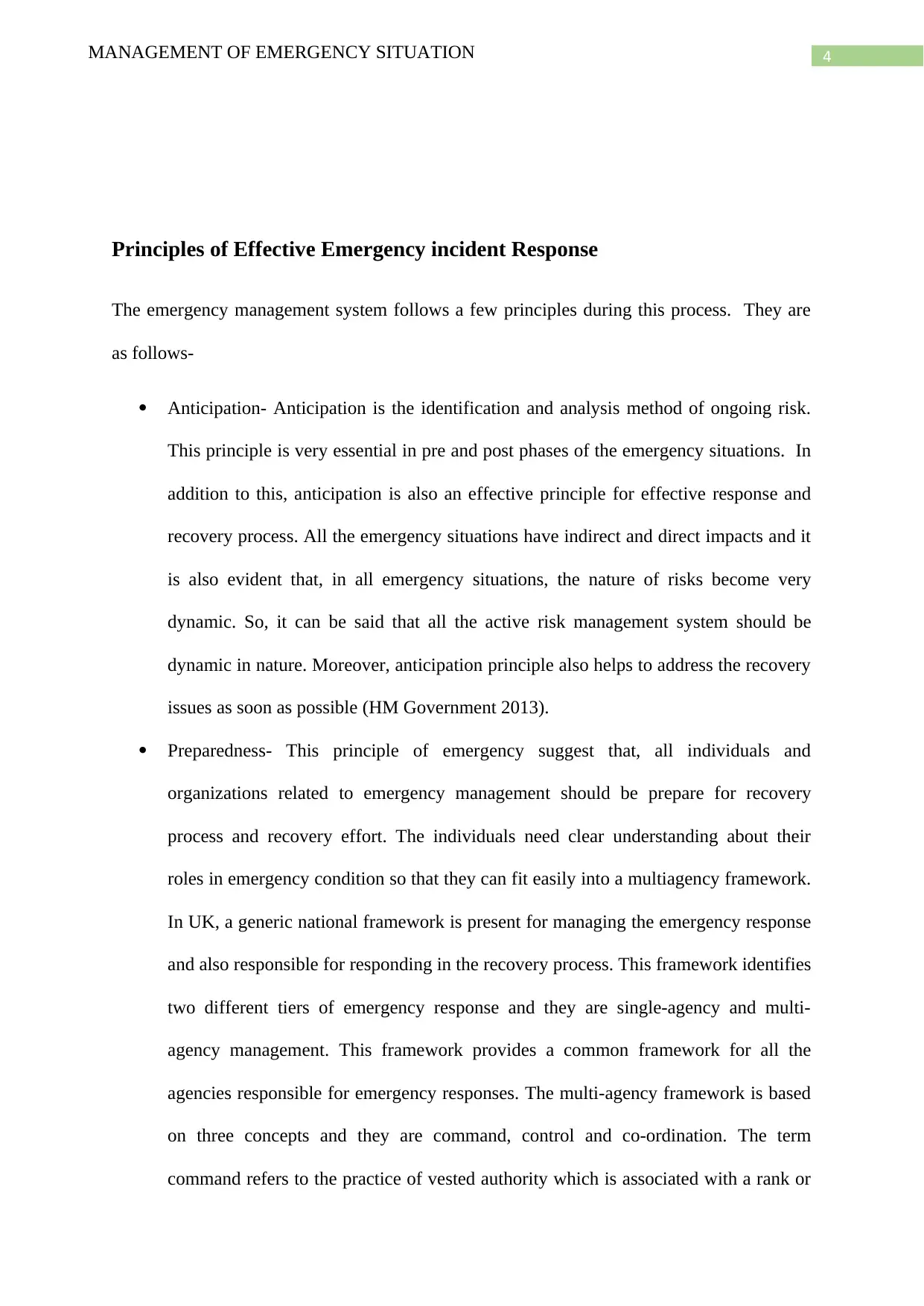
4MANAGEMENT OF EMERGENCY SITUATION
Principles of Effective Emergency incident Response
The emergency management system follows a few principles during this process. They are
as follows-
Anticipation- Anticipation is the identification and analysis method of ongoing risk.
This principle is very essential in pre and post phases of the emergency situations. In
addition to this, anticipation is also an effective principle for effective response and
recovery process. All the emergency situations have indirect and direct impacts and it
is also evident that, in all emergency situations, the nature of risks become very
dynamic. So, it can be said that all the active risk management system should be
dynamic in nature. Moreover, anticipation principle also helps to address the recovery
issues as soon as possible (HM Government 2013).
Preparedness- This principle of emergency suggest that, all individuals and
organizations related to emergency management should be prepare for recovery
process and recovery effort. The individuals need clear understanding about their
roles in emergency condition so that they can fit easily into a multiagency framework.
In UK, a generic national framework is present for managing the emergency response
and also responsible for responding in the recovery process. This framework identifies
two different tiers of emergency response and they are single-agency and multi-
agency management. This framework provides a common framework for all the
agencies responsible for emergency responses. The multi-agency framework is based
on three concepts and they are command, control and co-ordination. The term
command refers to the practice of vested authority which is associated with a rank or
Principles of Effective Emergency incident Response
The emergency management system follows a few principles during this process. They are
as follows-
Anticipation- Anticipation is the identification and analysis method of ongoing risk.
This principle is very essential in pre and post phases of the emergency situations. In
addition to this, anticipation is also an effective principle for effective response and
recovery process. All the emergency situations have indirect and direct impacts and it
is also evident that, in all emergency situations, the nature of risks become very
dynamic. So, it can be said that all the active risk management system should be
dynamic in nature. Moreover, anticipation principle also helps to address the recovery
issues as soon as possible (HM Government 2013).
Preparedness- This principle of emergency suggest that, all individuals and
organizations related to emergency management should be prepare for recovery
process and recovery effort. The individuals need clear understanding about their
roles in emergency condition so that they can fit easily into a multiagency framework.
In UK, a generic national framework is present for managing the emergency response
and also responsible for responding in the recovery process. This framework identifies
two different tiers of emergency response and they are single-agency and multi-
agency management. This framework provides a common framework for all the
agencies responsible for emergency responses. The multi-agency framework is based
on three concepts and they are command, control and co-ordination. The term
command refers to the practice of vested authority which is associated with a rank or
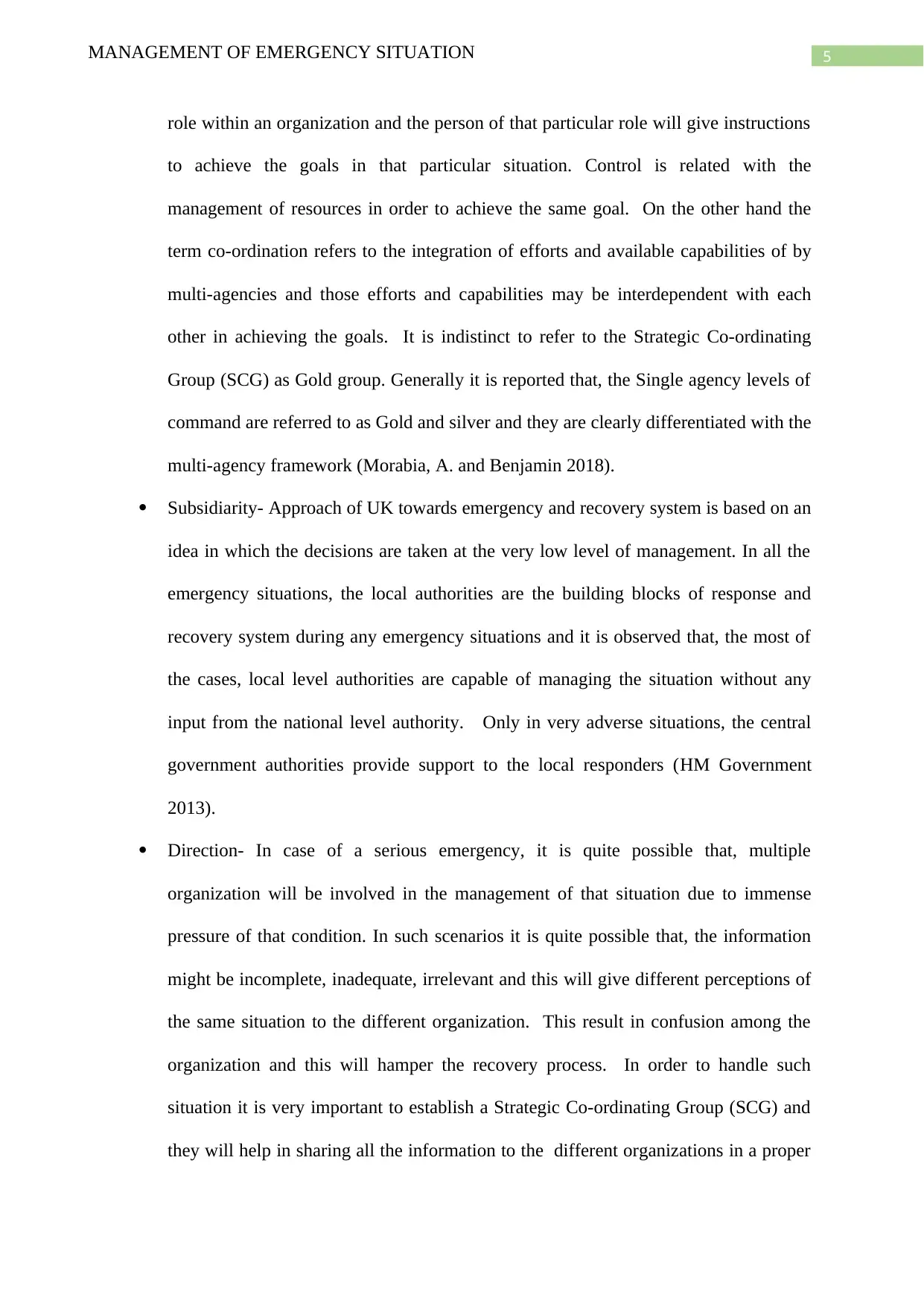
5MANAGEMENT OF EMERGENCY SITUATION
role within an organization and the person of that particular role will give instructions
to achieve the goals in that particular situation. Control is related with the
management of resources in order to achieve the same goal. On the other hand the
term co-ordination refers to the integration of efforts and available capabilities of by
multi-agencies and those efforts and capabilities may be interdependent with each
other in achieving the goals. It is indistinct to refer to the Strategic Co-ordinating
Group (SCG) as Gold group. Generally it is reported that, the Single agency levels of
command are referred to as Gold and silver and they are clearly differentiated with the
multi-agency framework (Morabia, A. and Benjamin 2018).
Subsidiarity- Approach of UK towards emergency and recovery system is based on an
idea in which the decisions are taken at the very low level of management. In all the
emergency situations, the local authorities are the building blocks of response and
recovery system during any emergency situations and it is observed that, the most of
the cases, local level authorities are capable of managing the situation without any
input from the national level authority. Only in very adverse situations, the central
government authorities provide support to the local responders (HM Government
2013).
Direction- In case of a serious emergency, it is quite possible that, multiple
organization will be involved in the management of that situation due to immense
pressure of that condition. In such scenarios it is quite possible that, the information
might be incomplete, inadequate, irrelevant and this will give different perceptions of
the same situation to the different organization. This result in confusion among the
organization and this will hamper the recovery process. In order to handle such
situation it is very important to establish a Strategic Co-ordinating Group (SCG) and
they will help in sharing all the information to the different organizations in a proper
role within an organization and the person of that particular role will give instructions
to achieve the goals in that particular situation. Control is related with the
management of resources in order to achieve the same goal. On the other hand the
term co-ordination refers to the integration of efforts and available capabilities of by
multi-agencies and those efforts and capabilities may be interdependent with each
other in achieving the goals. It is indistinct to refer to the Strategic Co-ordinating
Group (SCG) as Gold group. Generally it is reported that, the Single agency levels of
command are referred to as Gold and silver and they are clearly differentiated with the
multi-agency framework (Morabia, A. and Benjamin 2018).
Subsidiarity- Approach of UK towards emergency and recovery system is based on an
idea in which the decisions are taken at the very low level of management. In all the
emergency situations, the local authorities are the building blocks of response and
recovery system during any emergency situations and it is observed that, the most of
the cases, local level authorities are capable of managing the situation without any
input from the national level authority. Only in very adverse situations, the central
government authorities provide support to the local responders (HM Government
2013).
Direction- In case of a serious emergency, it is quite possible that, multiple
organization will be involved in the management of that situation due to immense
pressure of that condition. In such scenarios it is quite possible that, the information
might be incomplete, inadequate, irrelevant and this will give different perceptions of
the same situation to the different organization. This result in confusion among the
organization and this will hamper the recovery process. In order to handle such
situation it is very important to establish a Strategic Co-ordinating Group (SCG) and
they will help in sharing all the information to the different organizations in a proper
⊘ This is a preview!⊘
Do you want full access?
Subscribe today to unlock all pages.

Trusted by 1+ million students worldwide
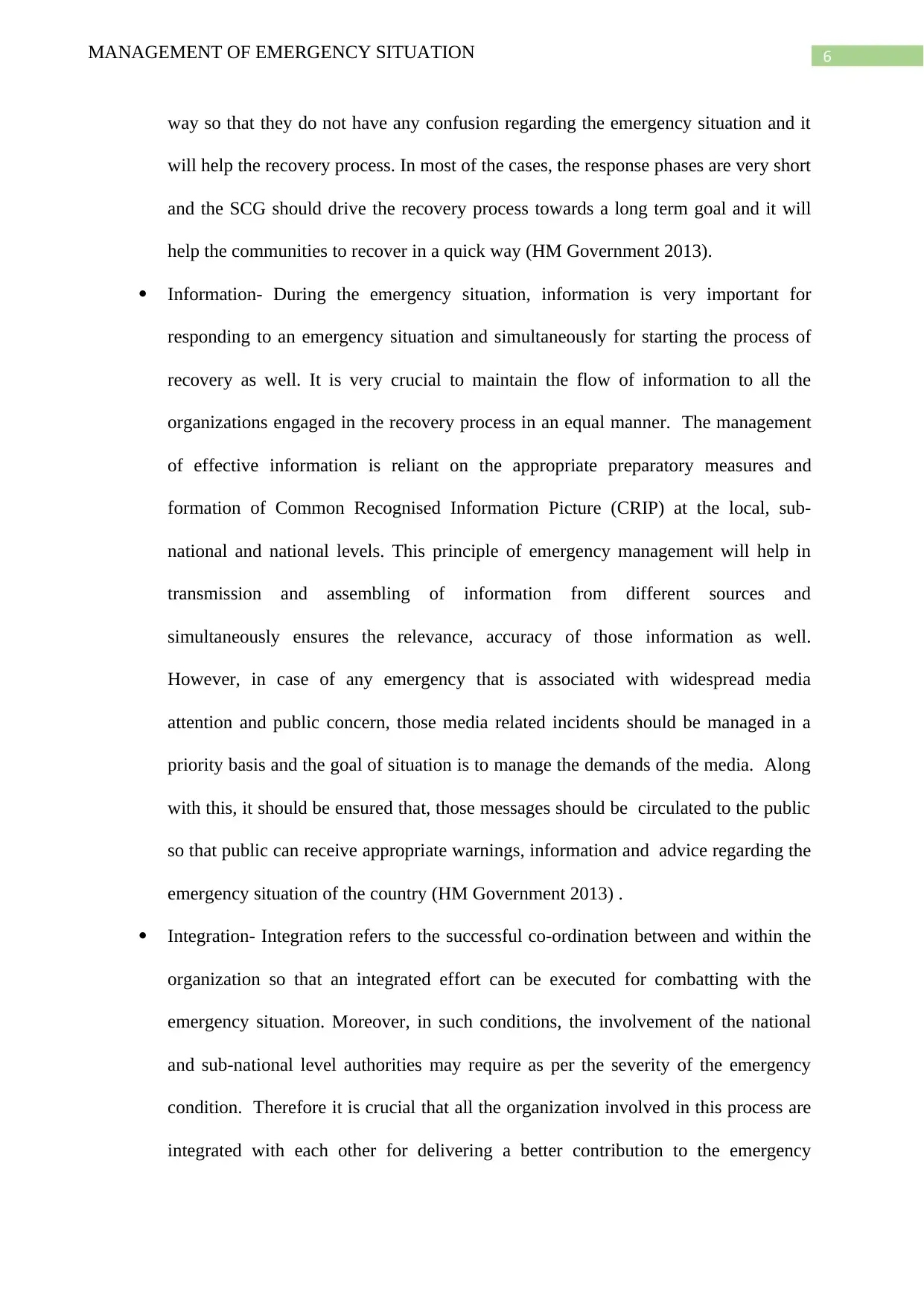
6MANAGEMENT OF EMERGENCY SITUATION
way so that they do not have any confusion regarding the emergency situation and it
will help the recovery process. In most of the cases, the response phases are very short
and the SCG should drive the recovery process towards a long term goal and it will
help the communities to recover in a quick way (HM Government 2013).
Information- During the emergency situation, information is very important for
responding to an emergency situation and simultaneously for starting the process of
recovery as well. It is very crucial to maintain the flow of information to all the
organizations engaged in the recovery process in an equal manner. The management
of effective information is reliant on the appropriate preparatory measures and
formation of Common Recognised Information Picture (CRIP) at the local, sub-
national and national levels. This principle of emergency management will help in
transmission and assembling of information from different sources and
simultaneously ensures the relevance, accuracy of those information as well.
However, in case of any emergency that is associated with widespread media
attention and public concern, those media related incidents should be managed in a
priority basis and the goal of situation is to manage the demands of the media. Along
with this, it should be ensured that, those messages should be circulated to the public
so that public can receive appropriate warnings, information and advice regarding the
emergency situation of the country (HM Government 2013) .
Integration- Integration refers to the successful co-ordination between and within the
organization so that an integrated effort can be executed for combatting with the
emergency situation. Moreover, in such conditions, the involvement of the national
and sub-national level authorities may require as per the severity of the emergency
condition. Therefore it is crucial that all the organization involved in this process are
integrated with each other for delivering a better contribution to the emergency
way so that they do not have any confusion regarding the emergency situation and it
will help the recovery process. In most of the cases, the response phases are very short
and the SCG should drive the recovery process towards a long term goal and it will
help the communities to recover in a quick way (HM Government 2013).
Information- During the emergency situation, information is very important for
responding to an emergency situation and simultaneously for starting the process of
recovery as well. It is very crucial to maintain the flow of information to all the
organizations engaged in the recovery process in an equal manner. The management
of effective information is reliant on the appropriate preparatory measures and
formation of Common Recognised Information Picture (CRIP) at the local, sub-
national and national levels. This principle of emergency management will help in
transmission and assembling of information from different sources and
simultaneously ensures the relevance, accuracy of those information as well.
However, in case of any emergency that is associated with widespread media
attention and public concern, those media related incidents should be managed in a
priority basis and the goal of situation is to manage the demands of the media. Along
with this, it should be ensured that, those messages should be circulated to the public
so that public can receive appropriate warnings, information and advice regarding the
emergency situation of the country (HM Government 2013) .
Integration- Integration refers to the successful co-ordination between and within the
organization so that an integrated effort can be executed for combatting with the
emergency situation. Moreover, in such conditions, the involvement of the national
and sub-national level authorities may require as per the severity of the emergency
condition. Therefore it is crucial that all the organization involved in this process are
integrated with each other for delivering a better contribution to the emergency
Paraphrase This Document
Need a fresh take? Get an instant paraphrase of this document with our AI Paraphraser
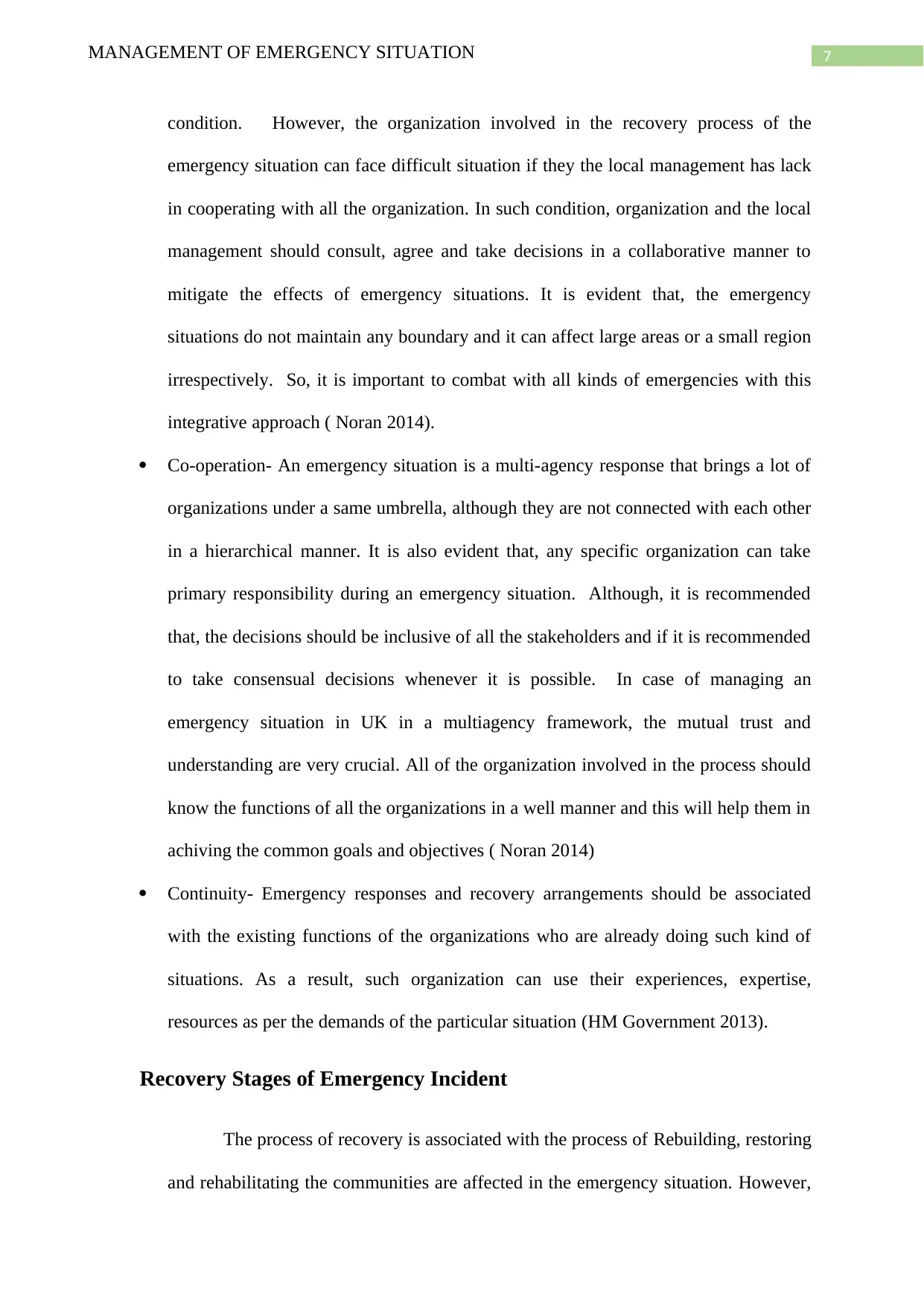
7MANAGEMENT OF EMERGENCY SITUATION
condition. However, the organization involved in the recovery process of the
emergency situation can face difficult situation if they the local management has lack
in cooperating with all the organization. In such condition, organization and the local
management should consult, agree and take decisions in a collaborative manner to
mitigate the effects of emergency situations. It is evident that, the emergency
situations do not maintain any boundary and it can affect large areas or a small region
irrespectively. So, it is important to combat with all kinds of emergencies with this
integrative approach ( Noran 2014).
Co-operation- An emergency situation is a multi-agency response that brings a lot of
organizations under a same umbrella, although they are not connected with each other
in a hierarchical manner. It is also evident that, any specific organization can take
primary responsibility during an emergency situation. Although, it is recommended
that, the decisions should be inclusive of all the stakeholders and if it is recommended
to take consensual decisions whenever it is possible. In case of managing an
emergency situation in UK in a multiagency framework, the mutual trust and
understanding are very crucial. All of the organization involved in the process should
know the functions of all the organizations in a well manner and this will help them in
achiving the common goals and objectives ( Noran 2014)
Continuity- Emergency responses and recovery arrangements should be associated
with the existing functions of the organizations who are already doing such kind of
situations. As a result, such organization can use their experiences, expertise,
resources as per the demands of the particular situation (HM Government 2013).
Recovery Stages of Emergency Incident
The process of recovery is associated with the process of Rebuilding, restoring
and rehabilitating the communities are affected in the emergency situation. However,
condition. However, the organization involved in the recovery process of the
emergency situation can face difficult situation if they the local management has lack
in cooperating with all the organization. In such condition, organization and the local
management should consult, agree and take decisions in a collaborative manner to
mitigate the effects of emergency situations. It is evident that, the emergency
situations do not maintain any boundary and it can affect large areas or a small region
irrespectively. So, it is important to combat with all kinds of emergencies with this
integrative approach ( Noran 2014).
Co-operation- An emergency situation is a multi-agency response that brings a lot of
organizations under a same umbrella, although they are not connected with each other
in a hierarchical manner. It is also evident that, any specific organization can take
primary responsibility during an emergency situation. Although, it is recommended
that, the decisions should be inclusive of all the stakeholders and if it is recommended
to take consensual decisions whenever it is possible. In case of managing an
emergency situation in UK in a multiagency framework, the mutual trust and
understanding are very crucial. All of the organization involved in the process should
know the functions of all the organizations in a well manner and this will help them in
achiving the common goals and objectives ( Noran 2014)
Continuity- Emergency responses and recovery arrangements should be associated
with the existing functions of the organizations who are already doing such kind of
situations. As a result, such organization can use their experiences, expertise,
resources as per the demands of the particular situation (HM Government 2013).
Recovery Stages of Emergency Incident
The process of recovery is associated with the process of Rebuilding, restoring
and rehabilitating the communities are affected in the emergency situation. However,
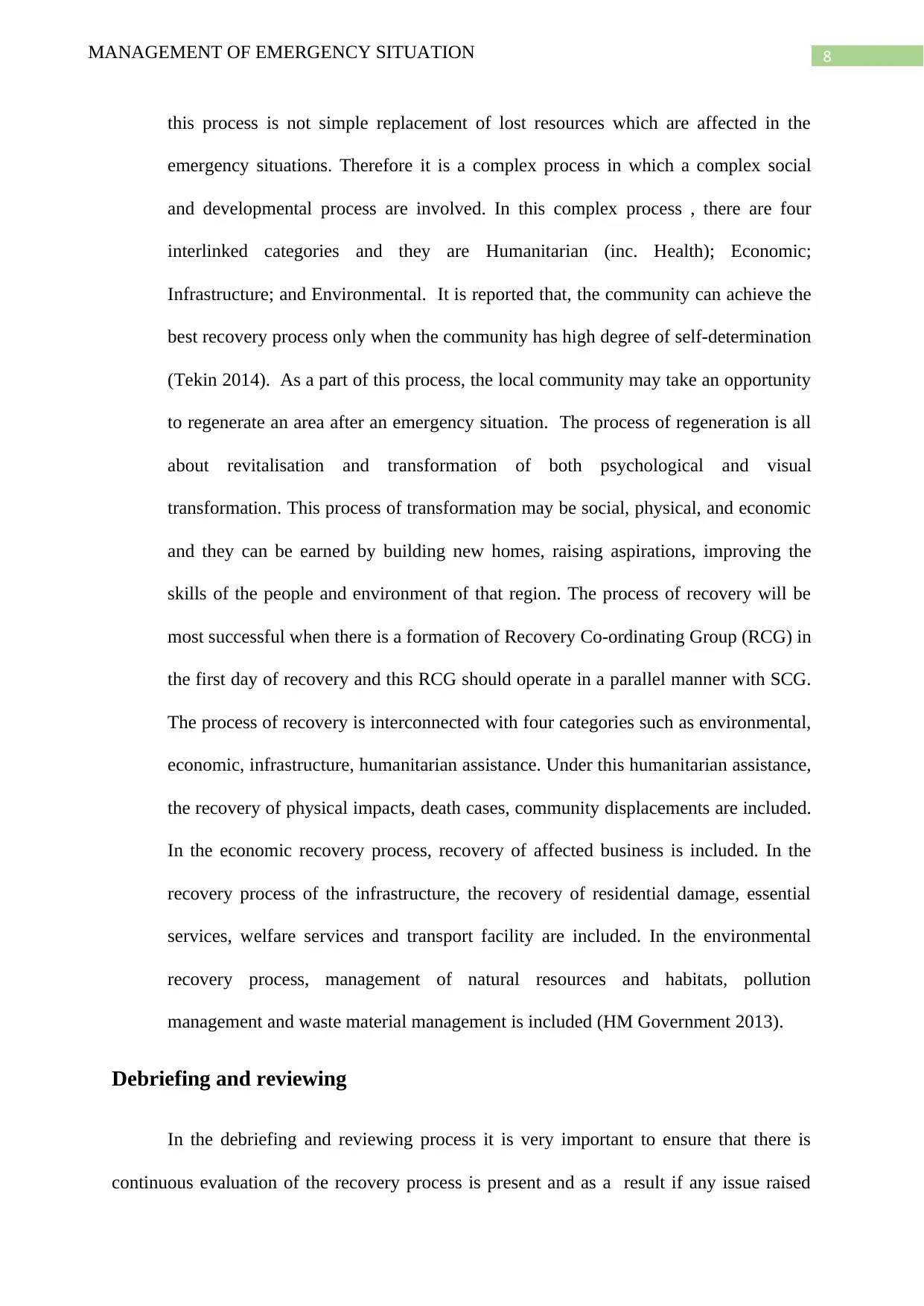
8MANAGEMENT OF EMERGENCY SITUATION
this process is not simple replacement of lost resources which are affected in the
emergency situations. Therefore it is a complex process in which a complex social
and developmental process are involved. In this complex process , there are four
interlinked categories and they are Humanitarian (inc. Health); Economic;
Infrastructure; and Environmental. It is reported that, the community can achieve the
best recovery process only when the community has high degree of self-determination
(Tekin 2014). As a part of this process, the local community may take an opportunity
to regenerate an area after an emergency situation. The process of regeneration is all
about revitalisation and transformation of both psychological and visual
transformation. This process of transformation may be social, physical, and economic
and they can be earned by building new homes, raising aspirations, improving the
skills of the people and environment of that region. The process of recovery will be
most successful when there is a formation of Recovery Co-ordinating Group (RCG) in
the first day of recovery and this RCG should operate in a parallel manner with SCG.
The process of recovery is interconnected with four categories such as environmental,
economic, infrastructure, humanitarian assistance. Under this humanitarian assistance,
the recovery of physical impacts, death cases, community displacements are included.
In the economic recovery process, recovery of affected business is included. In the
recovery process of the infrastructure, the recovery of residential damage, essential
services, welfare services and transport facility are included. In the environmental
recovery process, management of natural resources and habitats, pollution
management and waste material management is included (HM Government 2013).
Debriefing and reviewing
In the debriefing and reviewing process it is very important to ensure that there is
continuous evaluation of the recovery process is present and as a result if any issue raised
this process is not simple replacement of lost resources which are affected in the
emergency situations. Therefore it is a complex process in which a complex social
and developmental process are involved. In this complex process , there are four
interlinked categories and they are Humanitarian (inc. Health); Economic;
Infrastructure; and Environmental. It is reported that, the community can achieve the
best recovery process only when the community has high degree of self-determination
(Tekin 2014). As a part of this process, the local community may take an opportunity
to regenerate an area after an emergency situation. The process of regeneration is all
about revitalisation and transformation of both psychological and visual
transformation. This process of transformation may be social, physical, and economic
and they can be earned by building new homes, raising aspirations, improving the
skills of the people and environment of that region. The process of recovery will be
most successful when there is a formation of Recovery Co-ordinating Group (RCG) in
the first day of recovery and this RCG should operate in a parallel manner with SCG.
The process of recovery is interconnected with four categories such as environmental,
economic, infrastructure, humanitarian assistance. Under this humanitarian assistance,
the recovery of physical impacts, death cases, community displacements are included.
In the economic recovery process, recovery of affected business is included. In the
recovery process of the infrastructure, the recovery of residential damage, essential
services, welfare services and transport facility are included. In the environmental
recovery process, management of natural resources and habitats, pollution
management and waste material management is included (HM Government 2013).
Debriefing and reviewing
In the debriefing and reviewing process it is very important to ensure that there is
continuous evaluation of the recovery process is present and as a result if any issue raised
⊘ This is a preview!⊘
Do you want full access?
Subscribe today to unlock all pages.

Trusted by 1+ million students worldwide
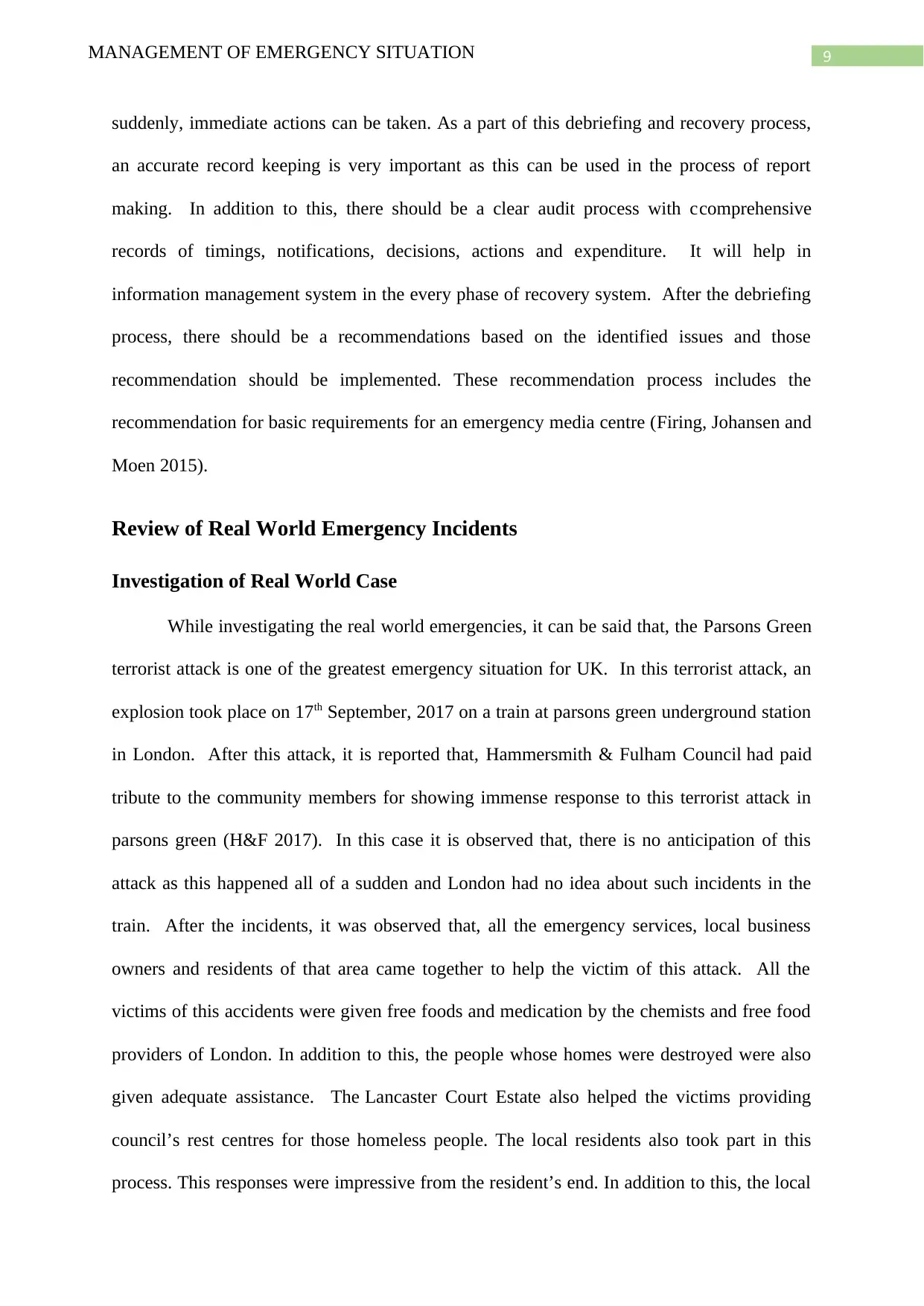
9MANAGEMENT OF EMERGENCY SITUATION
suddenly, immediate actions can be taken. As a part of this debriefing and recovery process,
an accurate record keeping is very important as this can be used in the process of report
making. In addition to this, there should be a clear audit process with ccomprehensive
records of timings, notifications, decisions, actions and expenditure. It will help in
information management system in the every phase of recovery system. After the debriefing
process, there should be a recommendations based on the identified issues and those
recommendation should be implemented. These recommendation process includes the
recommendation for basic requirements for an emergency media centre (Firing, Johansen and
Moen 2015).
Review of Real World Emergency Incidents
Investigation of Real World Case
While investigating the real world emergencies, it can be said that, the Parsons Green
terrorist attack is one of the greatest emergency situation for UK. In this terrorist attack, an
explosion took place on 17th September, 2017 on a train at parsons green underground station
in London. After this attack, it is reported that, Hammersmith & Fulham Council had paid
tribute to the community members for showing immense response to this terrorist attack in
parsons green (H&F 2017). In this case it is observed that, there is no anticipation of this
attack as this happened all of a sudden and London had no idea about such incidents in the
train. After the incidents, it was observed that, all the emergency services, local business
owners and residents of that area came together to help the victim of this attack. All the
victims of this accidents were given free foods and medication by the chemists and free food
providers of London. In addition to this, the people whose homes were destroyed were also
given adequate assistance. The Lancaster Court Estate also helped the victims providing
council’s rest centres for those homeless people. The local residents also took part in this
process. This responses were impressive from the resident’s end. In addition to this, the local
suddenly, immediate actions can be taken. As a part of this debriefing and recovery process,
an accurate record keeping is very important as this can be used in the process of report
making. In addition to this, there should be a clear audit process with ccomprehensive
records of timings, notifications, decisions, actions and expenditure. It will help in
information management system in the every phase of recovery system. After the debriefing
process, there should be a recommendations based on the identified issues and those
recommendation should be implemented. These recommendation process includes the
recommendation for basic requirements for an emergency media centre (Firing, Johansen and
Moen 2015).
Review of Real World Emergency Incidents
Investigation of Real World Case
While investigating the real world emergencies, it can be said that, the Parsons Green
terrorist attack is one of the greatest emergency situation for UK. In this terrorist attack, an
explosion took place on 17th September, 2017 on a train at parsons green underground station
in London. After this attack, it is reported that, Hammersmith & Fulham Council had paid
tribute to the community members for showing immense response to this terrorist attack in
parsons green (H&F 2017). In this case it is observed that, there is no anticipation of this
attack as this happened all of a sudden and London had no idea about such incidents in the
train. After the incidents, it was observed that, all the emergency services, local business
owners and residents of that area came together to help the victim of this attack. All the
victims of this accidents were given free foods and medication by the chemists and free food
providers of London. In addition to this, the people whose homes were destroyed were also
given adequate assistance. The Lancaster Court Estate also helped the victims providing
council’s rest centres for those homeless people. The local residents also took part in this
process. This responses were impressive from the resident’s end. In addition to this, the local
Paraphrase This Document
Need a fresh take? Get an instant paraphrase of this document with our AI Paraphraser
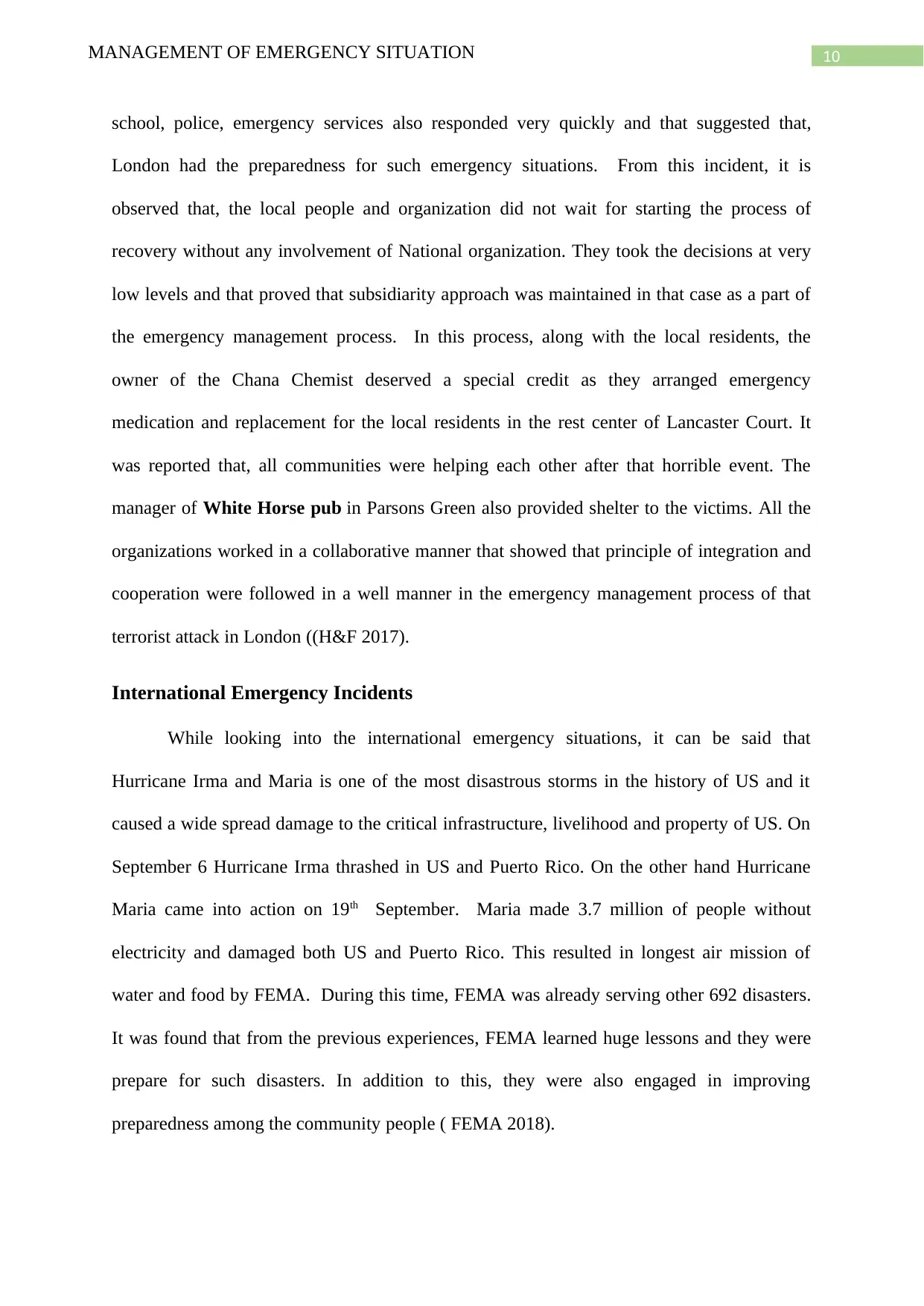
10MANAGEMENT OF EMERGENCY SITUATION
school, police, emergency services also responded very quickly and that suggested that,
London had the preparedness for such emergency situations. From this incident, it is
observed that, the local people and organization did not wait for starting the process of
recovery without any involvement of National organization. They took the decisions at very
low levels and that proved that subsidiarity approach was maintained in that case as a part of
the emergency management process. In this process, along with the local residents, the
owner of the Chana Chemist deserved a special credit as they arranged emergency
medication and replacement for the local residents in the rest center of Lancaster Court. It
was reported that, all communities were helping each other after that horrible event. The
manager of White Horse pub in Parsons Green also provided shelter to the victims. All the
organizations worked in a collaborative manner that showed that principle of integration and
cooperation were followed in a well manner in the emergency management process of that
terrorist attack in London ((H&F 2017).
International Emergency Incidents
While looking into the international emergency situations, it can be said that
Hurricane Irma and Maria is one of the most disastrous storms in the history of US and it
caused a wide spread damage to the critical infrastructure, livelihood and property of US. On
September 6 Hurricane Irma thrashed in US and Puerto Rico. On the other hand Hurricane
Maria came into action on 19th September. Maria made 3.7 million of people without
electricity and damaged both US and Puerto Rico. This resulted in longest air mission of
water and food by FEMA. During this time, FEMA was already serving other 692 disasters.
It was found that from the previous experiences, FEMA learned huge lessons and they were
prepare for such disasters. In addition to this, they were also engaged in improving
preparedness among the community people ( FEMA 2018).
school, police, emergency services also responded very quickly and that suggested that,
London had the preparedness for such emergency situations. From this incident, it is
observed that, the local people and organization did not wait for starting the process of
recovery without any involvement of National organization. They took the decisions at very
low levels and that proved that subsidiarity approach was maintained in that case as a part of
the emergency management process. In this process, along with the local residents, the
owner of the Chana Chemist deserved a special credit as they arranged emergency
medication and replacement for the local residents in the rest center of Lancaster Court. It
was reported that, all communities were helping each other after that horrible event. The
manager of White Horse pub in Parsons Green also provided shelter to the victims. All the
organizations worked in a collaborative manner that showed that principle of integration and
cooperation were followed in a well manner in the emergency management process of that
terrorist attack in London ((H&F 2017).
International Emergency Incidents
While looking into the international emergency situations, it can be said that
Hurricane Irma and Maria is one of the most disastrous storms in the history of US and it
caused a wide spread damage to the critical infrastructure, livelihood and property of US. On
September 6 Hurricane Irma thrashed in US and Puerto Rico. On the other hand Hurricane
Maria came into action on 19th September. Maria made 3.7 million of people without
electricity and damaged both US and Puerto Rico. This resulted in longest air mission of
water and food by FEMA. During this time, FEMA was already serving other 692 disasters.
It was found that from the previous experiences, FEMA learned huge lessons and they were
prepare for such disasters. In addition to this, they were also engaged in improving
preparedness among the community people ( FEMA 2018).
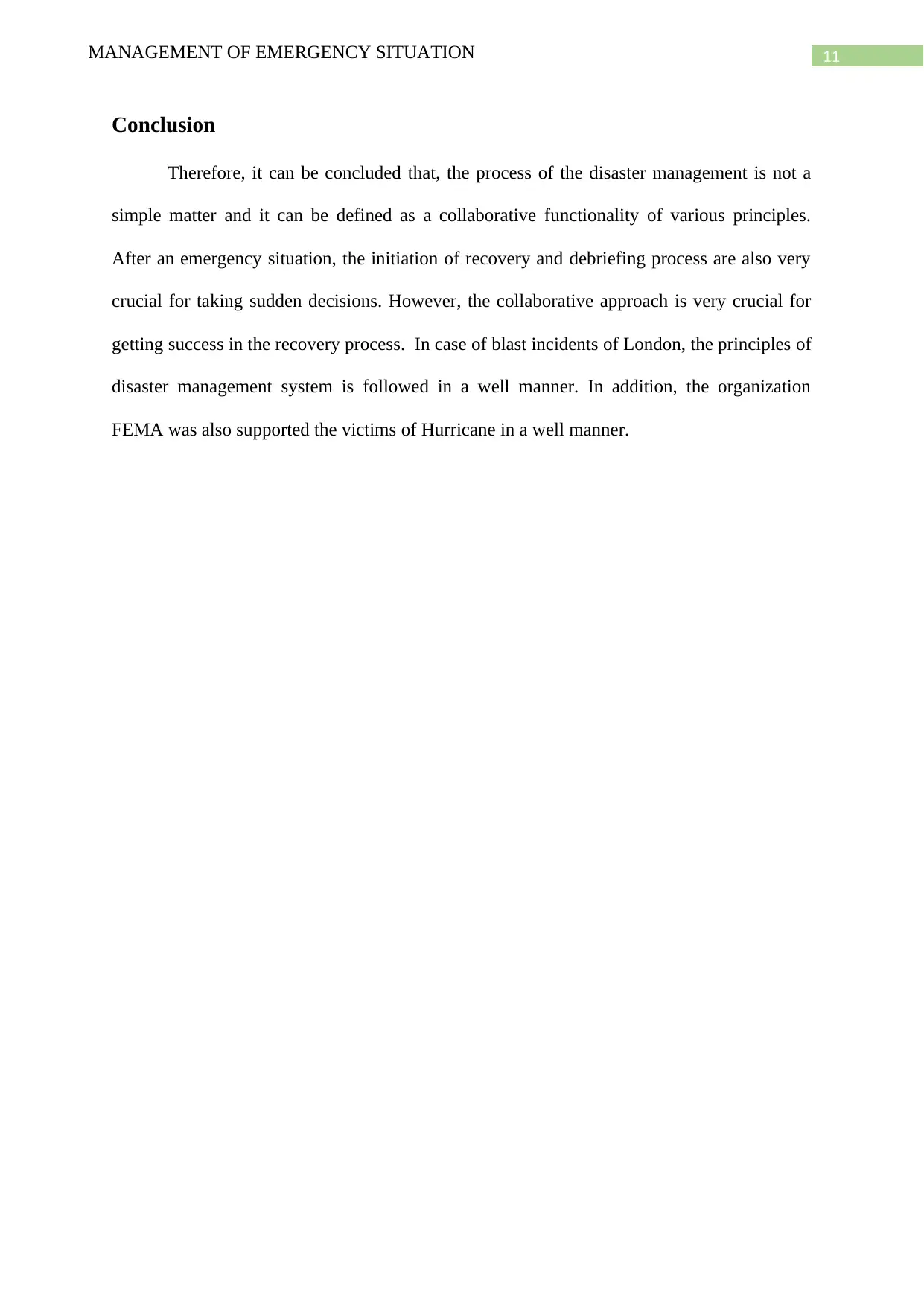
11MANAGEMENT OF EMERGENCY SITUATION
Conclusion
Therefore, it can be concluded that, the process of the disaster management is not a
simple matter and it can be defined as a collaborative functionality of various principles.
After an emergency situation, the initiation of recovery and debriefing process are also very
crucial for taking sudden decisions. However, the collaborative approach is very crucial for
getting success in the recovery process. In case of blast incidents of London, the principles of
disaster management system is followed in a well manner. In addition, the organization
FEMA was also supported the victims of Hurricane in a well manner.
Conclusion
Therefore, it can be concluded that, the process of the disaster management is not a
simple matter and it can be defined as a collaborative functionality of various principles.
After an emergency situation, the initiation of recovery and debriefing process are also very
crucial for taking sudden decisions. However, the collaborative approach is very crucial for
getting success in the recovery process. In case of blast incidents of London, the principles of
disaster management system is followed in a well manner. In addition, the organization
FEMA was also supported the victims of Hurricane in a well manner.
⊘ This is a preview!⊘
Do you want full access?
Subscribe today to unlock all pages.

Trusted by 1+ million students worldwide
1 out of 14
Your All-in-One AI-Powered Toolkit for Academic Success.
+13062052269
info@desklib.com
Available 24*7 on WhatsApp / Email
![[object Object]](/_next/static/media/star-bottom.7253800d.svg)
Unlock your academic potential
Copyright © 2020–2026 A2Z Services. All Rights Reserved. Developed and managed by ZUCOL.
